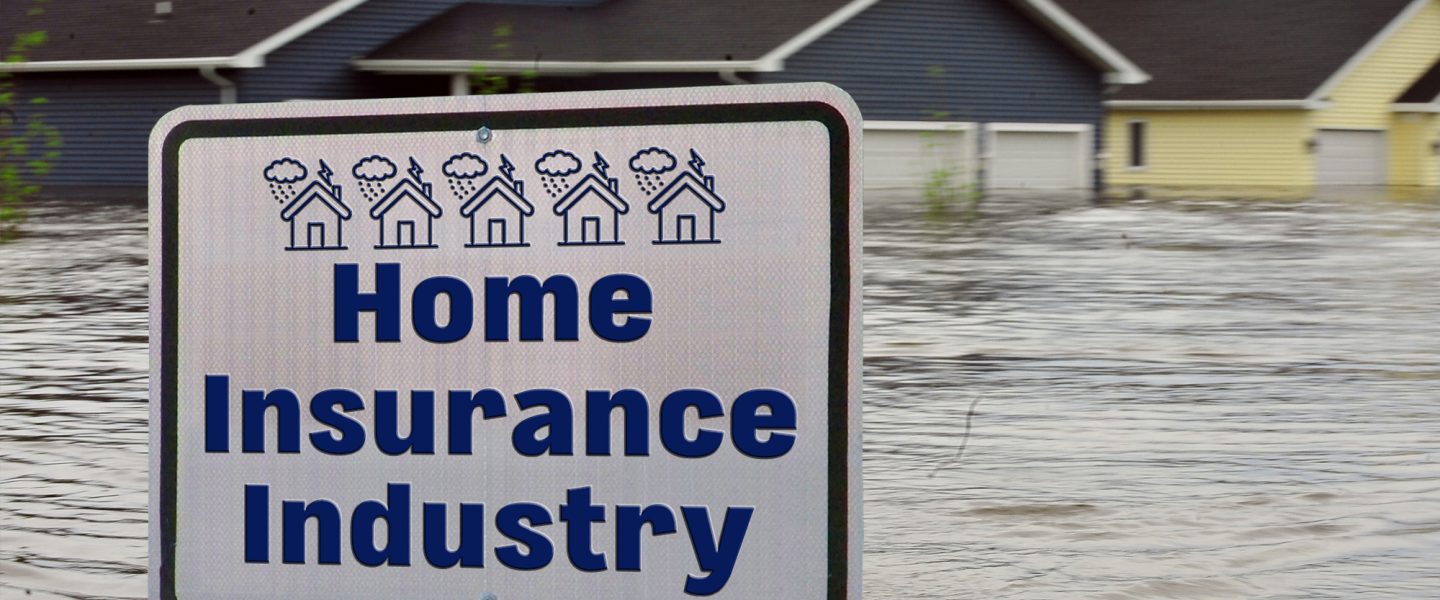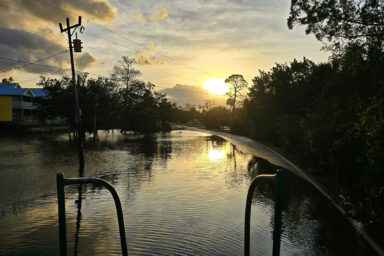Welcome to Saturday Hashtag, a weekly place for broader context.
|
Listen To This Story
|
This is the first edition Saturday Hashtag, a weekly selection of insightful articles on a specific topic. This week examines the implications of the insurance industry’s recent property insurance policies changes.
The current US property insurance situation has serious implications that reach far beyond just homeowners.
Home insurance rates around the nation are dramatically increasing and not just from climate related issues. The insurance industry lobby is a $45,173,132 business, employing 749 individuals, 61.28% being former government employees, that has created trojan horse tort reform, tax breaks, political favor, false public narratives and even written legislation.
Industry price outs or pull outs from the market will make it impossible to get, or worse, maintain property insurance. No insurance = no mortgage.
Without some type of federally sponsored insurance programs (e.g. Freddy/Fanny mortgages) this situation could easily lead to a catastrophic economic crash, especially considering the commodification of home mortgages. So it’s not just homeowners who might be in peril.
The Crippling Home Insurance Crisis Hitting America
From Financial Times: “It’s no secret that there’s a housing crisis in America. Shelter has accounted for the bulk of core inflation over the past couple of years. But even if you can afford a home, you may not be able to insure it. The cost of homeowner’s insurance in the US rose 23 percent from January 2023 to February 2024, even as coverage in many places is decreasing. In hurricane-prone Louisiana, premiums were up 63 percent. States such as Florida are becoming uninsurable, as providers pull out of the market altogether.”
Rising Home Insurance Rates Predicted in 2024
From Insurance Business: “Home insurance rates are rising across the country. Which states are experiencing the highest premium hikes? Read on and find out.”
The Insurance Lobby — The Persistently Powerful Foe
The author writes, “The “revolving door” [of insurance regulators transitioning to roles within the insurance industry] raises significant concerns about potential conflicts of interest and the effectiveness of regulatory oversight of the insurance industry.”
Temple Pushes Insurance Industry-Friendly Package With Hopes of Lower Policy Premiums
From Louisiana Illuminator: “A package of legislation to benefit insurance companies found widespread support in a Louisiana Senate committee [in March] after only one member questioned why the state would help the industry instead of drivers and homeowners who pay extraordinarily high premiums. The Senate Committee on Insurance approved four bills that are part of Louisiana Insurance Commissioner Tim Temple’s pro-industry agenda. Before winning election last year, Temple spent more than two decades in the insurance industry, managing and owning the kinds of companies he now regulates.”
Corporations Are Spending Millions on Lobbying to Avoid Taxes
The author writes, “FedEx spent $71 million on lobbying and campaign contributions from the 2016 election cycle through the 2020 cycle. How much did it pay in federal corporate income tax? Zero. Charter Communications spent $64 million on lobbying and campaign contributions during the same period. How much did it pay in federal corporate income tax? Also zero. Nike spent $8 million on lobbying and campaign contributions, but similarly completely avoided paying federal corporate income tax. That’s right, if you paid even a single dollar in federal taxes last year, you contributed more than FedEx, Charter, Nike and 52 other major corporations.”
Ron DeSantis Has Raked in $3.9 Million From Insurance Industry, Report Reveals
The author writes, “The governor has overseen a dramatic rise in home insurance premiums and legislative giveaways to insurance companies.”
Insurance Lobbyists Force Government to Heel on Medicare Advantage
From The American Prospect: “Industry pushback cowed a well-intentioned effort to prevent Medicare Advantage fraud and protect patient lives. Yet advocates who have spent decades fighting Medicare Advantage’s dominance are taking it as a kind of victory. That should tell you how powerful this industry has been historically.”
You Elected Them To Write New Laws. They’re Letting Corporations Do It Instead.
The authors write, “Each year, state lawmakers across the U.S. introduce thousands of bills dreamed up and written by corporations, industry groups and think tanks. Disguised as the work of lawmakers, these so-called ‘model’ bills get copied in one state Capitol after another, quietly advancing the agenda of the people who write them.”
The Home Insurance Market Is Crumbling. These Owners Are Paying the Price
The authors write, “As climate change increases the frequency and severity of extreme weather, insurers — especially those in areas most impacted by floods and fires — are raising their premiums, or pulling out altogether, impacting the affordability and availability of home and fire insurance.”
Government Supported Property Insurance Programs Are Here to Stay
The author writes, “If a home or business owner in the United States can’t find property insurance in the private market, they can buy it through a variety of hybrid public/private arrangements, often referred to as ‘pools’ or ‘Residual Market Mechanisms’ (insurance lingo for programs that cover risks private market insurers don’t want). These arrangements are federal and state government-sponsored ‘last resort’ programs through which an individual or business can buy insurance for fires, terrorist attacks, earthquakes, hurricanes, flooding, and other risks.”
Consequences of Commodification
The author writes, “This chapter explores the major consequences of commodification. It does so by focusing on five spheres that are crucial for social reproduction — healthcare, (higher) education, public utilities, housing, as well as food and agriculture.”
From Our Archives
US Insurance Giants Ditching Homeowners, but Still Underwriting Coal Industry
October 3, 2023: “Reports have mounted in recent months about US insurers announcing plans to end new insurance policies for homeowners in certain parts of the country, including California, where residential areas are increasingly vulnerable to wildfires, and Florida, where residents face the threat of hurricane and flood damage.”




